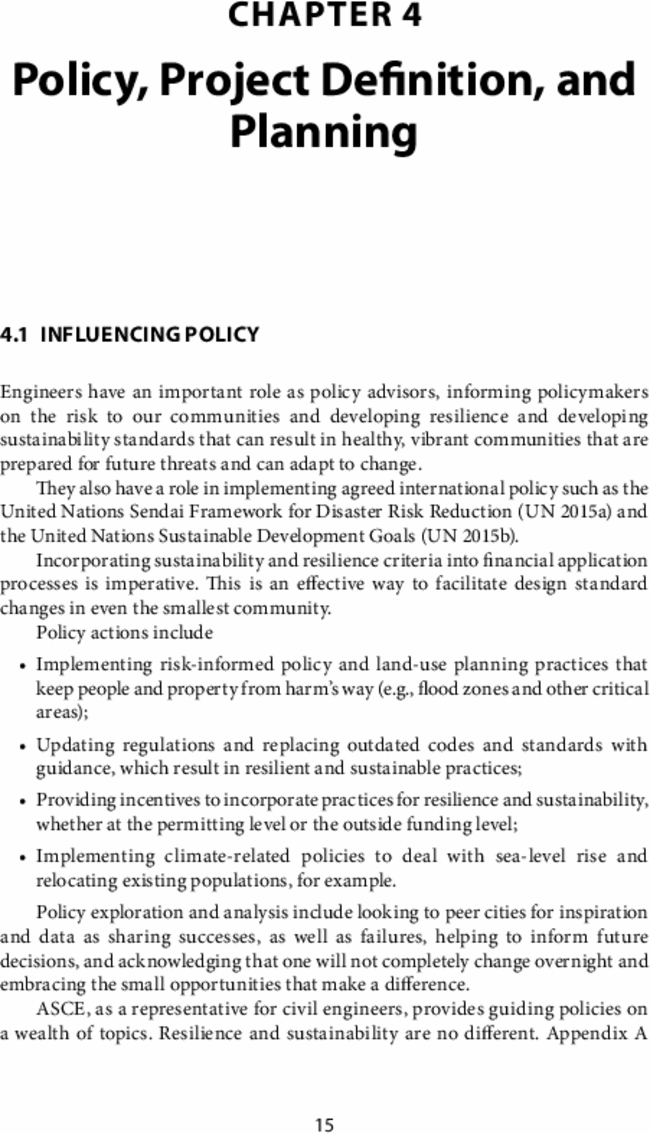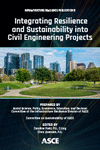Chapter 4
Policy, Project Definition, and Planning
Publication: Integrating Resilience and Sustainability into Civil Engineering Projects

Get full access to this article
View all available purchase options and get full access to this chapter.
References
Almufti, I., M. Willford, M. Delucchi, C. Davis, et al. 2013. “REDi rating system.” Accessed February 14, 2023. https://www.arup.com/perspectives/publications/research/section/redi-rating-system.
ASCE. 2019. Future world vision: Infrastructure reimagined. New York: ASCE.
ASCE. 2021. Impacts of future weather and climate extremes on United States infrastructure: Assessing and prioritizing adaptation actions, edited by M. Tye and J. Giovannettone. New York: ASCE.
ASCE. 2022. Future world vision: Infrastructure reimagined. Reston, VA: ASCE.
Blechman, F., C. Davidson, and W. Kelly. 2017. “Community participation.” Chap. 13 in Engineering for sustainable communities: Principles and practices, edited by W. Kelly, B. Luke, and R. Wright, Reston VA: ASCE.
Boffo, R., and R. Patalano. 2020. “ESG investing: Practices, progress and challenges.” Accessed March 16, 2023. https://www.oecd.org/finance/ESG-Investing-Practices-Progress-Challenges.pdf
BRE Group. 2022. “BREEAM.” Accessed February 11, 2022. https://www.breeam.com/.
Buchner, B., C. Deseglise, L. Kerr, M. Ridley, et al. 2021. “FAST-infra, climate policy initiative.” Accessed February 11, 2022. https://www.climatepolicyinitiative.org/fast-infra/.
CEEQUAL (The Civil Engineering Environmental Quality Assessment and Award Scheme Manual). 2022. “Achieve sustainable infrastructure with CEEQUAL.” Accessed February 11, 2022. https://www.bregroup.com/products/ceequal/.
City of Virginia Beach. 2020. “Getting sea level wise: Introduction and motivation behind the sea level wise program.” Accessed March 14, 2022. https://storymaps.arcgis.com/collections/5bde0a2b4cec4bf7966d0fc5d564d9d9?item=1.
Field, C., L. Pascoe, and E. Kotrotsou. 2017. “Structural engineering for the future.” In Proc., AEI 2017 Conf. Paper 62. Accessed February 15, 2023. https://ascelibrary.org/doi/book/10.1061/9780784480502.
Field, C., E. Sutley, N. Naderpajouh, J. W. van de Lindt, D. Butry, J. M. Keenan, J. Smith-Colin, and M. Koliou. 2022. “Incorporating socioeconomic metrics in civil engineering projects: The resilience perspective.” Nat. Hazards Rev. 23(1): 04021064.
Flynn, C., and C. Davidson. 2017. “Saving the rain in Onondaga County.” Chap. 25 in Engineering for sustainable communities: Principles and practices, edited by W. E. Kelly, B. Luke, and R. N. Wright. Reston, VA: ASCE.
Godschalk, D. R. 2003. “Urban hazard mitigation: Creating resilient cities.” Nat. Hazard. Rev. 4 (3): 136–143.
Greenroads. 2022. “Greenroads rating system.” Accessed February 11, 2022. https://www.greenroads.org/ratingsystem.
Haasnoot, M., J. Kwakkel, W. Walker, and J. ter Maat. 2013. “Dynamic adaptive policy pathways: A method for crafting robust decisions for a deeply uncertain world.” Global Environ. Change 23 (2): 485–498.
Hallegatte, S., J. Rentschler, and J. Rozenberg. 2019. The resilient infrastructure opportunity. Washington, DC: World Bank.
Helgeson, J., and C. O'Fallon. 2021. “Resilience dividends and resilience windfalls: Narratives that tie disaster resilience co-benefits to long-term sustainability.” Sustainability 13 (8): 4554.
ISI (Institute for Sustainable Infrastructure). 2022. “ENVISION: The blueprint for sustainable infrastructure.” Accessed March 24, 2023. https://sustainableinfrastructure.org/envision/overview-of-envision/.
Kay, R., M. Messerschmidt, M. Marks, and J. Liu. 2021. “Ramping-up climate adaptation through a ‘pathways’ approach.” Accessed February 15, 2023. https://www.icf.com/insights/environment/climate-adaptation-pathways-approach.
Kunreuther, H., E. Michel-Kerjan, and G. Tonn. 2016. Insurance, economic incentives and other policy tools for strengthening critical infrastructure resilience: 20 proposals for action. Center for Risk Management and Decision Processes. Philadelphia: Wharton School, University of Pennsylvania.
Little, R. 2004. “A socio-technical systems approach to understanding and enhancing the reliability of interdependent infrastructure systems.” Int. J. Emerg. Manage. 2 (1–2): 98–110.
Lovins, A. B. 2018. “How big is the energy efficiency resource?” Environ. Res. Lett. 13 (9): 090401.
OECD (Organization for Economic Co-Operation and Development). 2020. “Building resilience to Covid-19 pandemic: The role of centres of government.” Accessed February 11, 2022. http://www.oecd.org/coronavirus/policy-responses/building-resilience-to-the-covid-19-pandemic-the-role-of-centres-of-government-883d2961/.
Office of the Director of National Intelligence. 2021. “Global trends 2040.” Accessed February 16, 2022. https://www.dni.gov/index.php/gt2040-home/introduction.
Ottens, M., M. Franssen, P. Kroes, I. Van De Poel. 2006. “Modelling infrastructures as socio-technical systems.” Int. J. Crit. Infrastruct. 2 (2–3): 133–145.
PEER (Pacific Earthquake Engineering Research). 2022. “About PEER: Supporting grid modernization efforts worldwide. Accessed February 11, 2022.” https://peer.gbci.org/.
QSAND (Quantifying Sustainability in the Aftermath of Natural Disasters). 2022. “QSAND.” Accessed February 11, 2022. https://www.qsand.org/.
Rockefeller Foundation and Arup. 2014. “City resilience framework: City resilience index.” Accessed February 11, 2022. https://www.urban-response.org/system/files/content/resource/files/main/city-resilience-framework-arup-april-2014.pdf.
Shuster, L. A. 2019. “What lies ahead?” Civ. Eng. 89 (6): 56–63.
TCFD (Task Force on Climate-related Financial Disclosures). 2022. “Task force on climate-related financial disclosures.” Accessed February 11, 2022. https://www.fsb-tcfd.org/.
Tonn, G., A. Reilly, J. Czajkowski, H. Ghaedi, et al. 2021. “US transportation infrastructure resilience: Influences of insurance, incentives, and public assistance. Trans. Policy 100: (January): 108–119.
UN (United Nations). 2015a. Sendai framework for disaster risk reduction 2015–2030. Washington, DC: UN General Assembly.
UN. 2015b. Sustainable development goals. Washington, DC: UN Dept. of Economic and Social Affairs, Sustainable Development.
USGBC (US Green Building Council). 2022. “LEED rating system.” Accessed February 7, 2022. https://www.usgbc.org/leed.
Vodopivec, N., and E. Miller-Hooks. 2019. “Transit system resilience: Quantifying the impacts of disruptions on diverse populations.” Reliab. Eng. Syst. Saf. 191: 106561.
Information & Authors
Information
Published In
Integrating Resilience and Sustainability into Civil Engineering Projects
Pages: 15 - 37
Editors: Caroline Field and Chris Zawislak
ISBN (Online): 978-0-7844-8481-4
Copyright
© 2023 American Society of Civil Engineers.
History
Published online: May 4, 2023
ASCE Technical Topics:
Authors
Metrics & Citations
Metrics
Citations
Download citation
If you have the appropriate software installed, you can download article citation data to the citation manager of your choice. Simply select your manager software from the list below and click Download.
